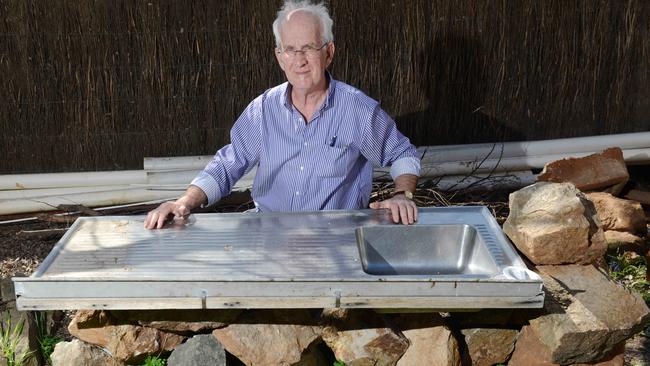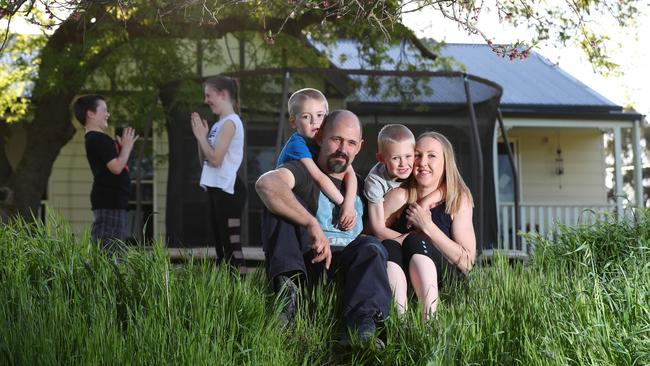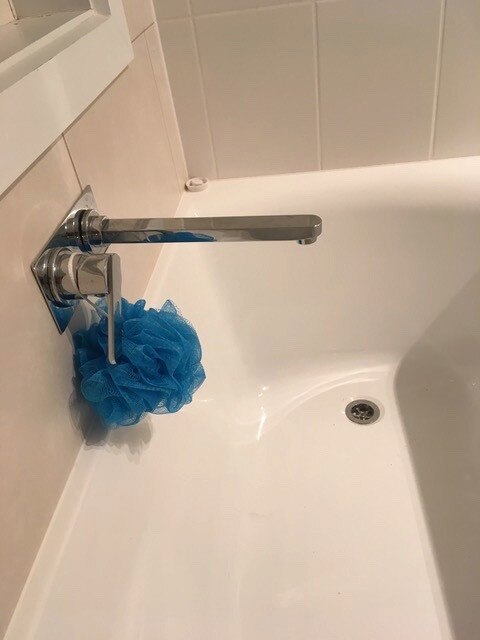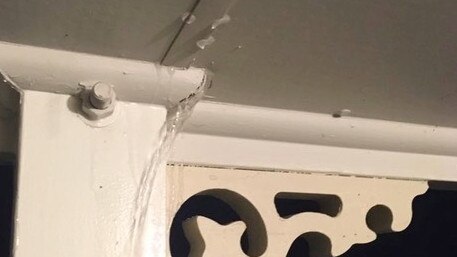‘How my dream home became a nightmare’: SA homeowners share their real life horror stories
“THE sad fact is there are rogues in the building industry – people who lack scruples,” says a veteran Adelaide-based building inspector. Here we investigate the rogue operators who give the industry a bad name and turn everyday life into a nightmare.
IMAGINE being a parent of young children and not having access to your kitchen, bathroom or running water inside your home for nearly two years – making do, instead, with a hose-filled outdoor sink through 40C summer days and 6C winter mornings.
What about learning the dream extension you’ve forked out tens of thousands of dollars for – and waited years to be completed – is seriously defective and will need to be demolished. Perhaps you’ve paid a deposit for a build that never got started.
As appalling as these scenarios seem, each are situations South Australians have found themselves in after settling on someone to renovate their home or build them a new one.
While most home builders deliver a professional service to their clients, each year the state’s Consumer and Business Services works to resolve about 550 construction-related complaints (and receives thousands more inquiries).
In June, the operator of an Adelaide Hills-based business selling customised transportable homes was penalised $400,000 and ordered to pay more than $200,000 in compensation after accepting money from clients but failing to provide them with buildings.
The Adelaide Magistrates Court heard how Samuel Wayne Baligac, while operating his business Balco Transportable, would demand excessive deposits, in some cases up to $33,000, for services that were never provided.
Magistrate Ian White described Baligac’s conduct as a “disgrace”, saying it had not only affected people’s lives but in some cases ruined lives as well.
Sadly, the magistrate’s stark summary is a reality veteran building inspector Chris Short sees far too often.
“It is widely known that relationships break up because of the stress (building disputes) create, particularly when it is a long, drawn-out thing that takes years to resolve,” he says.
“I have known of people who have ultimately divorced because of the stress of having to go through a building dispute.”

There are dire stories of people spiralling into depression and even taking their own lives.
“The consequences of (a severe building dispute) are much, much wider than people in the general population understand – the financial and emotional toll is huge,” Mr Short says.
The arguments can get quite nasty, especially when you have a clash of personalities between the owner and the builder.
“It is a woeful outcome for a lot of people. It is not uncommon for someone to burst into tears as I am inspecting building work at their home.”
The Advertiser spoke to several homeowners who are fighting to have “bad builds” fixed, sharing details of the horrors they’ve experienced on the proviso of anonymity.
One frustrated couple told how they had lived in a “partially complete” home with no kitchen, no running water, no primary bathroom and no laundry for the past 18 months, despite the initial time frame for the renovation set at four to five months.
They use a hose to fill their washing machine, which sits on the front veranda, and do their dishes in a makeshift sink in the yard.
Fed up and feeling they’ve been left no other option, they’ve launched legal action against the builder at “significant cost”.

Another told of the stress a four-year fight had placed on his family and how the cost of the build had swollen from about $30,000 to $75,000.
And there are claims of builders who have gone bust interstate then relocated and started up here under a new name.
Mr Short, the senior building consultant at Adelaide’s Blue Chip Building Consultants, estimates he inspects up to 200 home building defects each year.
He is also frequently called to appear as an expert witness in court and is getting “busier each year”.
Mr Short says some tradespeople and builders are simply unscrupulous.
“A number of builders have been prosecuted in the past two or three years whose behaviour is quite audacious, for example taking deposits for building work that never gets started,” he said.
“It is unbelievable to think that in 2018 such a thing could happen but it is actually happening out there.
“The sad fact is there are rogues in the building industry. There are people who lack scruples.”
Last year, Andrew James Laundy was found to have accepted substantial deposits for renovations as well as fencing and paving across Parafield Gardens, South Plympton, Camden Park and Oakland Park while failing to do the work.
At about the same time, the Adelaide Magistrates Court ordered cowboy builder Tom Edmonds to repay $60,000 to clients after hearing he had failed to finish a two-storey home at Port Lincoln and an extensive renovation of a Streaky Bay holiday home, allegedly leaving one of his clients $50,000 out of pocket.
Commissioner for Consumer Affairs Dini Soulio, responding to the cases, said it was important penalties were set to serve as “a strong deterrent to any tradesperson from accepting money for work they can’t deliver, and from exploiting consumers.”

Master Builders Association of SA CEO Ian Markos says it is unfortunate “rogue operators, especially unlicensed rogue operators, give the entire industry a bad name”.
He recommends consumers research properly before engaging a building contractor. “The starting point is checking the Consumer and Business Services website to ensure a builder is legally able to do the required work,” he says.
People and businesses that work in construction, trade, repairs, demolition, site preparation and restoration must be licensed building contractors.
“You should also ensure they are a Master Builders SA member so you can be confident you are dealing with somebody who is appropriately licensed and qualified.”
The Housing Industry Association urges people to look at a builder’s website to get an idea of the quality of their work, as well as details of any industry awards.
It says word-of-mouth recommendations from trusted people remains one of the best ways to find a builder or tradesperson.
Consumer and Business Services advises customers to know their rights when it comes to deposits. “If a builder asks for a deposit that seems excessive, you are well within your rights to question why,” a spokesman says. “Where the job is estimated at between $12,000 and $20,000, the law states the contractor can ask for a deposit of no more than $1000.
“Where the job is valued at more than $20,000, the contractor can ask for no more than five per cent of the total.”

Mr Short believes many of the issues he sees are a result of miscommunication and a lack of supervision.
“There is nothing wrong with subcontracting,’ he says.
“But when a builder relies on a subcontractor to achieve a particular result and doesn’t bother to go and check on the work at critical stages, that’s where the supervision falls down and faults are built into the work. Unfortunately, quite often they are not picked up until the house/renovation has been completed.”
Mr Short, who has almost three decades’ experience as a building inspector, recommends having a building consultant look over documen-tation before signing a contract
“The general population doesn’t understand building terminology, building jargon and it is difficult for them to get a proper appreciation of exactly what they are going to get for their money without having someone with some expertise read it first,” he says. And he says it is wrong to immediately assume it is always the builder who is at fault.
“As a builder, you may not have had any problems with clients over a large number of years and then all of a sudden encounter a client from hell,” he says. “Contractually, the builder is locked into the job and it can be absolute hell from the builder’s point of view.
“Consumers are more savvy these days than in the past but sometimes this also means their expectations can be a little unrealistic in terms of wanting a spectacular, sparkly product.
“Also, sadly, we are well down the American trail when it comes to litigation. There are people in the community who take some joy and seem to get their jollies from taking people in business down.”

One family’s story
COURTLAND and Sarah Batten were prepared to live in a “dumpy old house” for years while they saved up enough money to give their four children a beautiful place to call home.
They bought a small parcel of land at Undalya, on the edge of the Clare Valley, and moved into a long-abandoned cottage on the property with their four children.
“We had buckets hanging from the roof, the bathroom was covered in black mould … it was absolutely derelict,” Mr Batten says.
“But we made the decision to sacrifice comfort in the short term to get the home we wanted to bring up our children in.”
They chose a builder and watched as their dream home – a transportable-style built on site – went up.
“At the start of the build everything was going well and this continued almost to handover,” Mr Batten says.
“But when the external cladding was going on, we noticed the plumbing hadn’t been hooked up under the house.
“We pointed it out but were told ‘not to stress about it’. The house got sealed up and painted and the plumbing was still not connected.”


Mr Batten, who had negotiated for local earthmovers to construct the house pad, was then told the house was too low and there wasn’t the space for a plumber to get under it.
“It had all the internal plumbing but it was supposed to be brought to a connection point we could connect to a septic tank,” he says.
A qualified tradesman, he got under the house and did the work himself.
“(But) if I couldn’t have connected the plumbing myself, it would have been a nightmare.
“For someone else in that position, it would have been absolutely horrible.”
Mr Batten says the family was confronted with a host of other less-than-ideal issues, ranging from varnishing over muddy footprints on the decking, to the cladding not being properly secured, a leaking roof and ill-fitting fixtures in the bathroom.
“We fought for 2½ years to get different things fixed but eventually gave up,” Mr Batten says.
“It was just terrible and really taxing on us all and we will never build again.”

What the experts say
ASK people you trust for recommendations.
GET three quotes using the same plans.
CHECK to see if the person is licensed to do the job by searching the public licensing register.
ASK the builder for three references from people who have had work done, then check the quality.
ASK to see the contractor’s licence/registration card. This includes a photograph of the contractor along with details of the scope of work they can perform.
CHECK reliable building reviews online.
PAY deposits with a credit card if available to take advantage of the merchant agreement with your credit provider and the charge-back provisions if things go wrong (that is, if work does not start).
IF the contractor asks for a deposit, know your rights: A deposit of more than $1000 for a job valued at less than $12,000 is usually considered unreasonable.
– Tips from the Consumer and Business Services of SA
